- Home
- Lemony Snicket
The Grim Grotto asoue-11
The Grim Grotto asoue-11 Read online
The Grim Grotto
( A Series of Unfortunate Events - 11 )
Lemony Snicket
The Grim Grotto
For Beatrice –
Dead women tell no tales.
Sad men write them down
Chapter One
After a great deal of time examining oceans, investigating rainstorms, and staring very hard at several drinking fountains, the scientists of the world developed a theory regarding how water is distributed around our planet, which they have named "the water cycle." The water cycle consists of three key phenomena – evaporation, precipitation, and collection – and all of them are equally boring.
Of course, it is boring to read about boring things, but it is better to read something that makes you yawn with boredom than something that will make you weep uncontrollably, pound your fists against the floor, and leave tearstains all over your pillowcase, sheets, and boomerang collection. Like the water cycle, the tale of the Baudelaire children consists of three key phenomena, but rather than read their sorry tale it would be best if you read something about the water cycle instead.
Violet, the eldest phenomenon, was nearly fifteen years old and very nearly the best inventor the world had ever seen. As far as I can tell she was certainly the best inventor who had ever found herself trapped in the gray waters of the Stricken Stream, clinging desperately to a toboggan as she was carried away from the Valley of Four Drafts, and if I were you I would prefer to focus on the boring phenomenon of evaporation, which refers to the process of water turning into vapor and eventually forming clouds, rather than think about the turmoil that awaited her at the bottom of the Mortmain Mountains.
Klaus was the second eldest of the Baudelaire siblings, but it would be better for your health if you concentrated on the boring phenomenon of precipitation, which refers to vapor turning back into water and falling as rain, rather than spending even one moment thinking about the phenomenon of Klaus's excellent skills as a researcher, and the amount of trouble and woe these skills would bring him once he and his siblings met up with Count Olaf, the notorious villain who had been after the children ever since their parents had perished in a terrible fire.
And even Sunny Baudelaire, who had recently passed out of babyhood, is a phenomenon all to herself, not only for her very sharp teeth, which had helped the Baudelaires in a number of unpleasant circumstances, but also for her newfound skills as a cook, which had fed the Baudelaires in a number of unpleasant circumstances. Although the phenomenon of collection, which describes the gathering of fallen rain into one place so it can evaporate once more and begin the entire tedious process all over again, is probably the most boring phenomenon in the water cycle, it would be far better for you to get up and go right to your nearest library and spend several boring days reading every single boring fact you can find about collection, because the phenomenon of what happens to Sunny Baudelaire over the course of these pages is the most dreadful phenomenon I can think of, and I can think of a great many. The water cycle may be a series of boring phenomena, but the story of the Baudelaires is something else entirely, and this is an excellent opportunity to read something boring instead of learning what became of the Baudelaires as the rushing waters of the Stricken Stream carried them away from the mountains.
"What will become of us?" Violet asked, raising her voice to be heard over the rushing water. "I don't think I can invent anything that can stop this toboggan."
"I don't think you should try," Klaus called back to his sister. "The arrival of False Spring has thawed out the stream, but the waters are still very cold. If one of us fell into the stream, I'm not sure how long we could survive."
"Quigley," Sunny whimpered. The youngest Baudelaire often talked in a way that could be difficult to understand, but lately her speech had been developing almost as quickly as her cooking skills, and her siblings knew that Sunny was referring to Quigley Quagmire, with whom the Baudelaires had recently become friends. Quigley had helped Violet and Klaus reach the top of Mount Fraught in order to find the V.F.D. headquarters and rescue Sunny from Count Olaf's clutches, but another tributary of the Stricken Stream had carried him off in the opposite direction, and the cartographer – a word which here means "someone who is very good with maps, and of whom Violet Baudelaire was particularly fond" – didn't even have a toboggan to keep him out of the chilly water.
"I'm sure Quigley has gotten out of the water," Violet said quickly, although of course she was sure of no such thing. "I only wish we knew where he was going. He told us to meet him somewhere, but the waterfall interrupted him."
The toboggan bobbed in the water as Klaus reached into his pocket and drew out a dark blue notebook. The notebook had been a gift from Quigley, and Klaus was using it as a commonplace book, a phrase which here means "notebook in which he wrote any interesting or useful information." "We decoded that message telling us about an important V.F.D. gathering on Thursday," he said, "and thanks to Sunny, we know that the meeting is at the Hotel Denouement. Maybe that's where Quigley wants to meet us – at the last safe place."
"But we don't know where it is," Violet pointed out. "How can we meet someone in an unknown location?"
The three Baudelaires sighed, and for a few moments the siblings sat quietly on the toboggan and listened to the gurgling of the stream. There are some people who like to watch a stream for hours, staring at the glittering water and thinking about the mysteries of the world. But the waters of the Stricken Stream were too dirty to glitter, and every mystery the children tried to solve seemed to reveal even more mysteries, and even those mysteries contained mysteries, so when they pondered these mysteries they felt more overwhelmed than thoughtful. They knew that V.F.D. was a secret organization, but they couldn't seem to find out much about what the organization did, or why it should concern the Baudelaires. They knew that Count Olaf was very eager to get his filthy hands on a certain sugar bowl, but they had no idea why the sugar bowl was so important, or where in the world it was. They knew that there were people in the world who could help them, but so many of these people – guardians, friends, bankers – had proven to be of no help at all, or had vanished from their lives just when the Baudelaires needed them most. And they knew there were people in the world who would not help them – villainous people, and their number seemed to be growing as their treachery and wickedness trickled all over the earth, like a dreadful water cycle of woe and despair. But right now the biggest mystery seemed to be what to do next, and as the Baudelaires huddled together on the floating toboggan they could not think of a thing.
"If we stay on the toboggan," Violet said finally, "where do you think we'll go?"
"Down the mountains," Klaus said. "Water runs downhill. The Stricken Stream probably leads out of the Mortmain Mountains into the hinterlands, and then eventually it'll lead to some larger body of water – a lake, or an ocean. From there the water will evaporate into clouds, fall as rain and snow, and so on."
"Tedium," Sunny said.
"The water cycle is quite dull," Klaus agreed, "but it might be the easiest way to get us away from Count Olaf."
"That's true," Violet said. "Olaf said he'd be right behind us."
"Esmelita," Sunny said, which meant something like, "Along with Esmé Squalor and Carmelita Spats," and the Baudelaires frowned as they thought of Olaf's girlfriend, who participated in Olaf's schemes because she believed that treachery and deception were very stylish, or "in," and the former classmate of the Baudelaires' who had recently joined Olaf for selfish reasons of her own.
"So we're just going to sit on this toboggan," Violet asked, "and see where it takes us?"
"It's not much of a plan," Klaus admitted, "but I can't think of a better one."
"Passive," Sunny said, and her siblings nodded glumly. "Passive" is an unusual word to hear from a baby, and in fact it is an unusual word to hear from a Baudelaire or anyone else who leads an interesting life. It merely means "accepting what is happening without doing anything about it," and certainly everyone has passive moments from time to time. Perhaps you have experienced a passive moment at the shoe store, when you sat in a chair as the shoe salesperson forced your feet into a series of ugly and uncomfortable shoes, when all the while you wanted a bright red pair with strange buckles that nobody on earth was going to buy for you. The Baudelaires had experienced a passive moment at Briny Beach, where they had learned the terrible news about their parents, and had been numbly led by Mr. Poe toward their new unfortunate lives. I recently experienced a passive moment myself, sitting in a chair as a shoe salesperson forced my feet into a series of ugly and uncomfortable positions, when all the while I wanted a bright red pair of shoes with strange buckles that nobody on earth was going to buy for me. But a passive moment in the middle of a rushing stream, when villainous people are hot on your trail, is a difficult moment to accept, which is why the Baudelaires fidgeted on the toboggan as the Stricken Stream carried them further and further downhill, just as I fidgeted as I tried to plan my escape from that sinister shoe emporium. Violet fidgeted and thought of Quigley, hoping he had managed to escape from the cold water and get himself to safety. Klaus fidgeted and thought of V.F.D., hoping that he could still learn more about the organization even though their headquarters had been destroyed. And Sunny fidgeted and thought of the fish in the Stricken Stream, who would occasionally stick their heads out of the ashen water and cough. She was wondering if the ashes, which were left in the water by a recent fire in the mountains and made it difficult for the fish to breathe, would mean the fish wouldn't taste very good, even if you used a recipe with plenty of butter and lemon.
The Baudelaires were so busy fidgeting and thinking that when the toboggan rounded one of the odd, square sides of the mountain peaks, it was a moment before they noticed the view spread below them. Only when a few scraps of newspaper blew in front of their faces did the Baudelaires look down and gasp at what they saw.
"What is it?" Violet said.
"I don't know," Klaus said. "It's hard to tell from so high up."
"Subjavik," Sunny said, and she spoke the truth. From this side of the Mortmain Mountains, the Baudelaires had expected to see the hinterlands, a vast expanse of flat landscape where they had spent quite some time. Instead, it looked like the world had turned into a dark, dark sea. As far as the eye could see there were swirls of gray and black, moving like strange eels in shadowy water. Every so often one of the swirls would release a small, fragile object that would float up toward the Baudelaires like a feather. Some of these objects were scraps of newspaper. Others appeared to be tiny bits of cloth. And some of them were so dark that they were utterly unrecognizable, a phrase Sunny preferred to express as "subjavik."
Klaus squinted down through his glasses and then turned to his sisters with a look of despair. "I know what it is," he said quietly. "It's the ruins of a fire."
The Baudelaires looked down again and saw that Klaus was right. From such a height, it had taken the children a moment to realize that a great fire had raged through the hinterlands, leaving only ashen scraps behind.
"Of course," Violet said. "It's strange we didn't recognize it before. But who would set fire to the hinterlands?"
"We did," Klaus said.
"Caligari," Sunny said, reminding Violet of a terrible carnival in which the Baudelaires had spent some time in disguise. Sadly, as part of their disguise it had been necessary to assist Count Olaf in burning down the carnival, and now they could see the fruits of their labors, a phrase which here means "the results of the terrible thing they did, even though they did not mean to do it at all."
"The fire isn't our fault," Violet said. "Not entirely. We had to help Olaf, otherwise he would have discovered our disguises."
"He discovered our disguises anyway," Klaus pointed out.
"Noblaym," Sunny said, which meant something like, "But it's still not our fault."
"Sunny's right," Violet said. "We didn't think up the plot – Olaf did."
"We didn't stop him, either," Klaus pointed out. "And plenty of people think we're entirely responsible. These scraps of newspaper are probably from The Daily Punctilio, which has blamed us for all sorts of terrible crimes."
"You're right," Violet said with a sigh, although I have since discovered that Klaus was wrong, and that the scraps of paper blowing past the Baudelaires were from another publication that would have been of enormous help had they stopped to collect the pieces. "Maybe we should be passive for a while. Being active hasn't helped us much."
"In any case," Klaus said, "we should stay on the toboggan. Fire can't hurt us if we're floating on a stream."
"It doesn't seem like we have a choice," Violet said. "Look."
The Baudelaires looked, and saw that the toboggan was approaching a sort of intersection, where another tributary of the Stricken Stream was meeting up with theirs. The stream was now much wider, and the water even rougher, so the Baudelaires had to hang on tight in order not to be thrown into the deepening waters.
"We must be approaching a larger body of water," Klaus said. "We're further along in the water cycle than I thought."
"Do you think that's the tributary that carried away Quigley?" Violet said, craning her neck to look for her missing friend.
"Selphawa!" Sunny cried, which meant "We can't think about Quigley now – we have to think about ourselves," and the youngest Baudelaire was right. With a great whoosh! the stream turned another square corner, and within moments the waters of the stream were churning so violently that it felt as if the Baudelaires were riding a wild horse rather than a broken toboggan.
"Can you steer the toboggan toward the shore?" Klaus yelled over the sound of the stream.
"No!" Violet cried. "The steering mechanism broke when we rode down the waterfall, and the stream is too wide to paddle there!" Violet found a ribbon in her pocket and paused to tie up her hair in order to think better. She gazed down at the toboggan and tried to think of various mechanical blueprints she had read in her childhood, when her parents were alive and supportive of her interests in mechanical engineering. "The runners of the toboggan," she said, and then repeated it in a shout to be heard over the water. "The runners! They help the toboggan maneuver on the snow, but maybe they can help us steer on the water!"
"Where are the runners?" Klaus asked, looking around.
"On the bottom of the toboggan!" Violet cried.
"Imposiyakto?" Sunny asked, which meant something like, "How can we get to the bottom of the toboggan?"
"I don't know," Violet said, and frantically checked her pockets for any inventing materials. She had been carrying a long bread knife, but now it was gone – probably carried away by the stream, along with Quigley, when she had used it last. She looked straight ahead, at the frothy rush of water threatening to engulf them. She gazed at the distant shores of the stream, which grew more and more distant as the stream continued to widen. And she looked at her siblings, who were waiting for her inventing skills to save them. Her siblings looked back, and all three Baudelaires looked at one another for a moment, blinking dark water out of their eyes, as they tried to think of something to do.
Just at that moment, however, one more eye arrived, also blinking dark water as it rose out of the stream, right in front of the Baudelaires. At first it seemed to be the eye of some terrible sea creature, found only in books of mythology and in the swimming pools of certain resorts. But as the toboggan took them closer, the children could see that the eye was made of metal, perched on top of a long metal pole that curved at the top so the eye could get a better look at them. It is very unusual to see a metal eye rising up out of the rushing waters of a stream, and yet this eye was something the Baudelaires had seen many times, since
their first encounter with an eye tattoo on Count Olaf's left ankle. The eye was an insignia, and when you looked at it in a certain way it also looked like three mysterious letters.
"V.F.D.!" Sunny cried, as the toboggan drew even closer.
"What is it?" Klaus asked.
"It's a periscope!" Violet said. "Submarines use them to look at things above the water!"
"Does that mean," Klaus cried, "that there's a submarine beneath us?"
Violet did not have to answer, because the eye rose further out of the water, and the orphans could see that the pole was attached to a large, flat piece of metal, most of which was under the water. The toboggan drew closer until the periscope was in reach, and then stopped, the way a raft will stop when it hits a large rock.
"Look!" Violet cried as the stream rushed around them. She pointed to a hatch just at the bottom of the periscope. "Let's knock – maybe they can hear us!"
"But we have no idea who's inside," Klaus said.
"Taykashans!" Sunny shrieked, which meant "It's our only chance to travel safely through these waters," and she leaned down to the hatch and scraped at it with her teeth. Her siblings joined her, preferring to use their fists to pound on the metal hatch.
"Hello!" Violet cried.
"Hello!" Klaus yelled.
"Shalom!" Sunny shrieked.
Over the sound of the rushing stream, the Baudelaires heard a very dim sound coming from behind the hatch. The sound was a human voice, very deep and echoey as if it were coming from the bottom of a well. "Friend or foe?" it said.
The Baudelaires looked at one another. They knew, as I'm sure you know, that "friend or foe" is a traditional greeting directed at visitors who approach an important place, such as a royal palace or a fiercely guarded shoe store, and must identify themselves as either a friend or a foe of the people inside. But the siblings did not know if they were friends or foes for the simple reason that they had no idea who was talking.

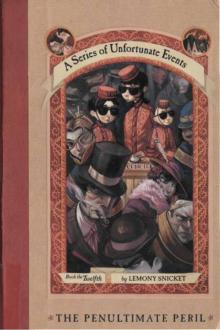 The Penultimate Peril
The Penultimate Peril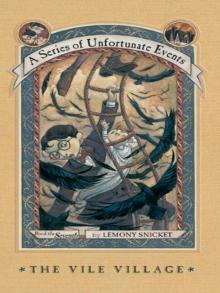 The Vile Village
The Vile Village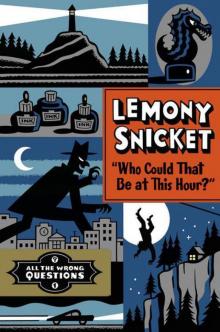 Who Could That Be at This Hour?
Who Could That Be at This Hour?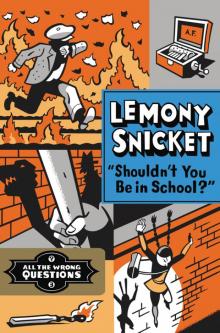 Shouldn't You Be in School?
Shouldn't You Be in School?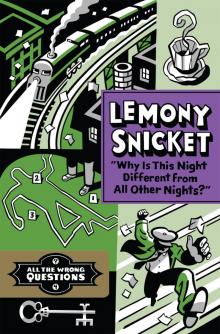 Why Is This Night Different From All Other Nights?
Why Is This Night Different From All Other Nights?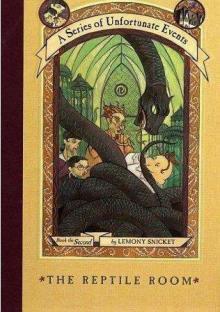 The Reptile Room
The Reptile Room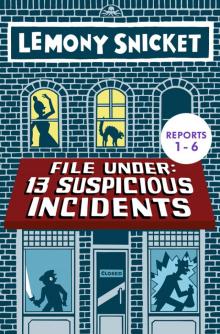 File Under: 13 Suspicious Incidents (1-6)
File Under: 13 Suspicious Incidents (1-6) The End
The End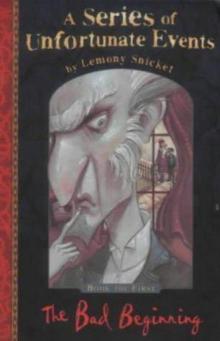 The Bad Beginning
The Bad Beginning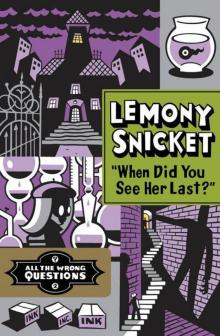 When Did You See Her Last?
When Did You See Her Last?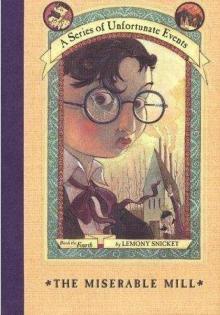 The Miserable Mill
The Miserable Mill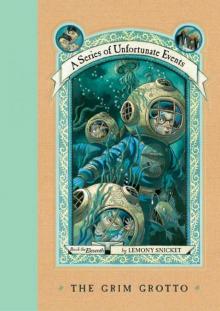 The Grim Grotto
The Grim Grotto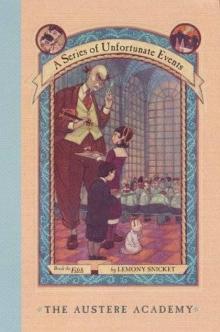 The Austere Academy
The Austere Academy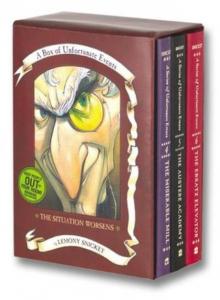 The Ersatz Elevator
The Ersatz Elevator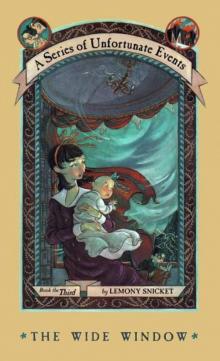 The Wide Window
The Wide Window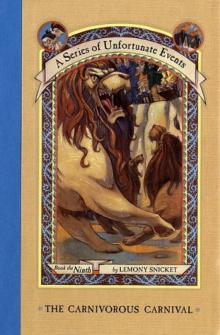 The Carnivorous Carnival
The Carnivorous Carnival A Series of Unfortunate Events Box: The Complete Wreck
A Series of Unfortunate Events Box: The Complete Wreck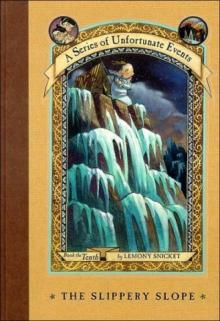 The Slippery Slope
The Slippery Slope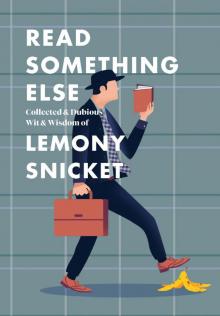 Read Something Else
Read Something Else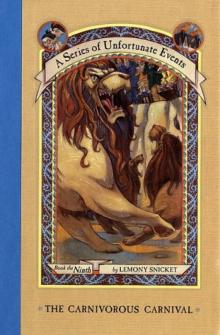 The Carnivorous Carnival asoue-9
The Carnivorous Carnival asoue-9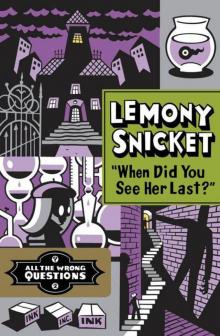 When Did You See Her Last
When Did You See Her Last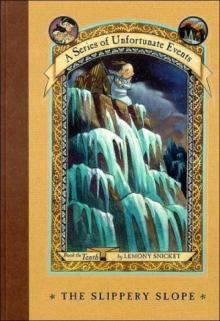 The Slippery Slope asoue-10
The Slippery Slope asoue-10 The Hostile Hospital asoue-8
The Hostile Hospital asoue-8 A Series of Unfortunate Events Collection: Books 1-13 with Bonus Material
A Series of Unfortunate Events Collection: Books 1-13 with Bonus Material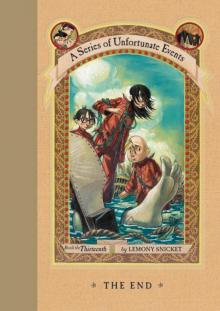 The End asoue-13
The End asoue-13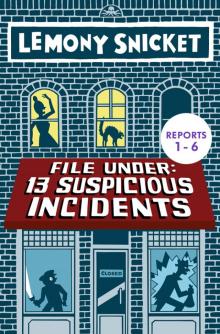 File Under
File Under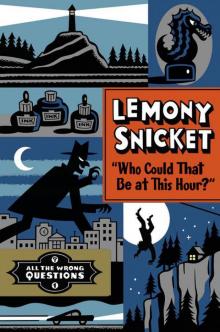 Who Could That Be at This Hour? (All the Wrong Questions)
Who Could That Be at This Hour? (All the Wrong Questions)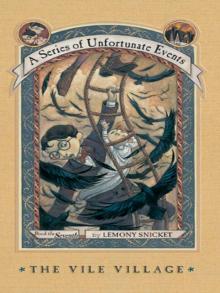 The Vile Village asoue-7
The Vile Village asoue-7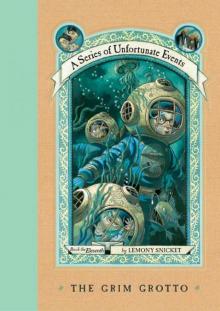 The Grim Grotto asoue-11
The Grim Grotto asoue-11